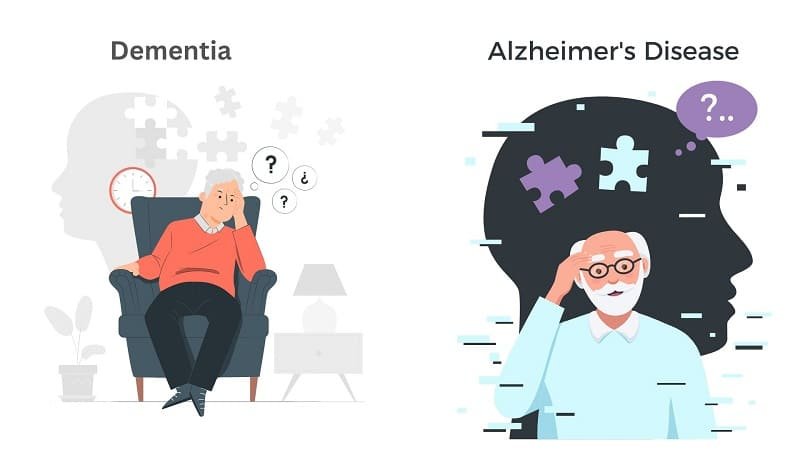Introduction:
Alzheimer’s disease is a complex and devastating condition that affects millions of individuals worldwide. While the exact cause remains elusive, researchers have identified several factors that may contribute to the development of this progressive neurodegenerative disorder. In this comprehensive blog, we will delve into five key causes of Alzheimer’s disease, shedding light on the intricate web of elements that may play a role in its onset. Also Feel Free to learn about If Alzheimer and Dementia are Same?
1) Age – The Unavoidable Factor:
The most significant and unavoidable risk factor for Alzheimer’s disease is age. As individuals grow older, the likelihood of developing this debilitating condition increases. While Alzheimer’s is not a normal part of aging, the risk rises substantially after the age of 65. The aging process is accompanied by changes in the brain, including the accumulation of abnormal protein deposits, which are characteristic of Alzheimer’s.
2) Genetics and Family History – Unlocking the Genetic Code:
Genetic factors contribute significantly to the risk of developing Alzheimer’s disease. Individuals with a family history of the condition, particularly those with a first-degree relative (parent or sibling) affected, face an elevated risk. Specific genes, such as the Apolipoprotein E (APOE) gene, have been identified as playing a role in Alzheimer’s susceptibility. Research is ongoing to unravel the intricate interplay between genetic predisposition and environmental factors. Look for Early Signs of Alziehmer in 60’s
3) Head Trauma – The Lingering Impact:
Severe head injuries, especially those resulting in loss of consciousness, have been linked to an increased risk of Alzheimer’s disease later in life. Whether due to sports-related injuries, accidents, or military service, traumatic brain injuries can initiate a cascade of events that contribute to the formation of abnormal protein clumps and the deterioration of brain tissue. Understanding the long-term consequences of head trauma is crucial for developing preventive measures.
4) Cardiovascular Health – The Heart-Brain Connection:
Emerging evidence suggests a strong link between cardiovascular health and Alzheimer’s disease. Conditions such as hypertension, high cholesterol, and diabetes have been associated with an elevated risk of developing cognitive decline. The intricate network of blood vessels supplying the brain underscores the importance of maintaining a healthy cardiovascular system for preserving cognitive function and reducing the risk of Alzheimer’s.
5) Cardiovascular Health – The Heart-Brain Connection:
Several lifestyle factors can influence the risk of Alzheimer’s disease. Adopting unhealthy habits, such as a sedentary lifestyle, poor dietary choices, smoking, and excessive alcohol consumption, may contribute to the development of Alzheimer’s. Conversely, engaging in regular physical activity, maintaining a balanced diet rich in antioxidants and omega-3 fatty acids, and avoiding harmful habits can support brain health and potentially reduce the risk of cognitive decline.
Conclusion:
While the causes of Alzheimer’s disease are complex and multifaceted, gaining a deeper understanding of these key factors is essential for advancing research, prevention, and treatment strategies. As scientists continue to unravel the mysteries of Alzheimer’s, it is crucial to emphasize the importance of a holistic approach to brain health, encompassing lifestyle modifications, early detection, and ongoing research efforts aimed at unlocking the secrets of this formidable disease. By addressing these causes collectively, we can strive to reduce the impact of Alzheimer’s on individuals, families, and communities worldwide.
Faq Related to "5 Causes of Alzheimer’s Disease"
While age is a significant risk factor for Alzheimer’s disease, it is not exclusively an age-related condition. Alzheimer’s can affect individuals before the age of 65, and early-onset cases may have a genetic component. However, advancing age remains the most prominent risk factor.
Genetic factors play a role in Alzheimer’s risk, with a family history of the disease increasing susceptibility. Specific genes, such as APOE, have been identified. While genetics can contribute, Alzheimer’s is often a result of a complex interplay between genetic and environmental factors.
Severe head injuries, especially those causing loss of consciousness, have been associated with an elevated risk of Alzheimer’s. The severity of trauma matters, and repeated injuries may pose additional risks. However, not all head injuries lead to Alzheimer’s, and the relationship is complex.
Conditions like hypertension, high cholesterol, and diabetes are linked to an increased risk of Alzheimer’s. Maintaining a healthy cardiovascular system through lifestyle changes, such as regular exercise and a balanced diet, may contribute to reducing the risk of cognitive decline.
Unhealthy lifestyle choices, including a sedentary lifestyle, poor diet, smoking, and excessive alcohol consumption, may contribute to Alzheimer’s risk. Adopting a healthy lifestyle, such as engaging in regular physical activity, maintaining a balanced diet, and avoiding harmful habits, can support brain health.
As of now, there is no cure for Alzheimer’s disease. Treatment options focus on managing symptoms and improving quality of life. Research is ongoing to develop new therapies and understand the underlying causes better.
While prevention is challenging, adopting a healthy lifestyle, staying mentally and socially active, managing cardiovascular health, and seeking early medical intervention can potentially reduce the risk or delay the onset of Alzheimer’s disease.
Yes, extensive research is being conducted to unravel the complexities of Alzheimer’s disease. Scientists are exploring genetic, environmental, and lifestyle factors to enhance our understanding and develop more effective prevention and treatment strategies.
Individuals can support Alzheimer’s research and awareness by participating in clinical trials, advocating for increased funding, and promoting education about the disease. Donating to reputable organizations focused on Alzheimer’s research is also a valuable contribution.
Reputable sources such as Alzheimer’s associations, medical institutions, and government health agencies provide reliable information. Always consult with healthcare professionals for personalized advice and the latest updates on Alzheimer’s research and treatment.











